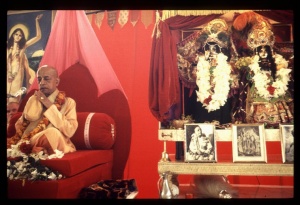CC Madhya 25.278: Difference between revisions
m (1 revision(s)) |
(Vanibot #0054 edit - transform synonyms into clickable links, which search similar occurrences) |
||
| (One intermediate revision by one other user not shown) | |||
| Line 1: | Line 1: | ||
{{ | [[Category:Sri Caitanya-caritamrta - Madhya-lila Chapter 25|C278]] | ||
<div style="float:left">'''[[Sri Caitanya-caritamrta|Śrī Caitanya-caritāmṛta]] - [[CC Madhya|Madhya-līlā]] - [[CC Madhya 25|Chapter 25: How All the Residents of Vārāṇasī Became Vaiṣṇavas]]'''</div> | |||
<div style="float:right">[[File:Go-previous.png|link=CC Madhya 25.277|Madhya-līlā 25.277]] '''[[CC Madhya 25.277|Madhya-līlā 25.277]] - [[CC Madhya 25.279|Madhya-līlā 25.279]]''' [[File:Go-next.png|link=CC Madhya 25.279|Madhya-līlā 25.279]]</div> | |||
{{CompareVersions|CC|Madhya 25.278|CC 1975|CC 1996}} | |||
{{RandomImage}} | |||
==== TEXT 278 ==== | ==== TEXT 278 ==== | ||
<div class="verse"> | |||
<div | :ye līlā-amṛta vine, khāya yadi anna-pāne, | ||
ye līlā-amṛta vine, khāya yadi anna-pāne, | :tabe bhaktera durbala jīvana | ||
tabe bhaktera durbala jīvana | :yāra eka-bindu-pāne, utphullita tanu-mane, | ||
yāra eka-bindu-pāne, utphullita tanu-mane, | :hāse, gāya, karaye nartana | ||
hāse, gāya, karaye nartana | |||
</div> | </div> | ||
| Line 15: | Line 18: | ||
==== SYNONYMS ==== | ==== SYNONYMS ==== | ||
<div class="synonyms"> | |||
<div | ''[//vanipedia.org/wiki/Special:VaniSearch?s=ye&tab=syno_o&ds=1 ye]'' — he who; ''[//vanipedia.org/wiki/Special:VaniSearch?s=līlā&tab=syno_o&ds=1 līlā]'' — of the pastimes of Lord Kṛṣṇa and Caitanya Mahāprabhu; ''[//vanipedia.org/wiki/Special:VaniSearch?s=amṛta&tab=syno_o&ds=1 amṛta] [//vanipedia.org/wiki/Special:VaniSearch?s=vine&tab=syno_o&ds=1 vine]'' — without nectar; ''[//vanipedia.org/wiki/Special:VaniSearch?s=khāya&tab=syno_o&ds=1 khāya] [//vanipedia.org/wiki/Special:VaniSearch?s=yadi&tab=syno_o&ds=1 yadi] [//vanipedia.org/wiki/Special:VaniSearch?s=anna&tab=syno_o&ds=1 anna]-[//vanipedia.org/wiki/Special:VaniSearch?s=pāne&tab=syno_o&ds=1 pāne]'' — if one eats only ordinary food grains; ''[//vanipedia.org/wiki/Special:VaniSearch?s=tabe&tab=syno_o&ds=1 tabe]'' — then; ''[//vanipedia.org/wiki/Special:VaniSearch?s=bhaktera&tab=syno_o&ds=1 bhaktera]'' — of the devotees; ''[//vanipedia.org/wiki/Special:VaniSearch?s=durbala&tab=syno_o&ds=1 durbala] [//vanipedia.org/wiki/Special:VaniSearch?s=jīvana&tab=syno_o&ds=1 jīvana]'' — life'' becomes weakened; ''[//vanipedia.org/wiki/Special:VaniSearch?s=yāra&tab=syno_o&ds=1 yāra]'' — of which; ''[//vanipedia.org/wiki/Special:VaniSearch?s=eka&tab=syno_o&ds=1 eka]-[//vanipedia.org/wiki/Special:VaniSearch?s=bindu&tab=syno_o&ds=1 bindu]-[//vanipedia.org/wiki/Special:VaniSearch?s=pāne&tab=syno_o&ds=1 pāne]'' — if one drinks one drop; ''[//vanipedia.org/wiki/Special:VaniSearch?s=utphullita&tab=syno_o&ds=1 utphullita] [//vanipedia.org/wiki/Special:VaniSearch?s=tanu&tab=syno_o&ds=1 tanu]-[//vanipedia.org/wiki/Special:VaniSearch?s=mane&tab=syno_o&ds=1 mane]'' — the body and mind become jubilant; ''[//vanipedia.org/wiki/Special:VaniSearch?s=hāse&tab=syno_o&ds=1 hāse]'' — laughs; ''[//vanipedia.org/wiki/Special:VaniSearch?s=gāya&tab=syno_o&ds=1 gāya]'' — chants; ''[//vanipedia.org/wiki/Special:VaniSearch?s=karaye&tab=syno_o&ds=1 karaye] [//vanipedia.org/wiki/Special:VaniSearch?s=nartana&tab=syno_o&ds=1 nartana]'' — dances. | ||
</div> | </div> | ||
| Line 23: | Line 25: | ||
==== TRANSLATION ==== | ==== TRANSLATION ==== | ||
<div class="translation"> | |||
<div | Men become strong and stout by eating sufficient grains, but the devotee who simply eats ordinary grains but does not taste the transcendental pastimes of Lord Caitanya Mahāprabhu and Kṛṣṇa gradually becomes weak and falls down from the transcendental position. However, if one drinks but a drop of the nectar of Kṛṣṇa's pastimes, his body and mind begin to bloom, and he begins to laugh, sing and dance. | ||
Men become strong and stout by eating sufficient grains, but the devotee who simply eats ordinary grains but does not taste the transcendental pastimes of Lord Caitanya Mahāprabhu and Kṛṣṇa gradually becomes weak and falls down from the transcendental position. However, if one drinks but a drop of the nectar of | |||
</div> | </div> | ||
==== PURPORT ==== | ==== PURPORT ==== | ||
<div class="purport"> | |||
All the devotees connected with the Kṛṣṇa consciousness movement must read all the books that have been translated (the ''Caitanya-caritāmṛta'', ''Śrīmad-Bhāgavatam'', ''Bhagavad-gītā'' and others); otherwise, after some time, they will simply eat, sleep and fall down from their position. Thus they will miss the opportunity to attain an eternal, blissful life of transcendental pleasure. | |||
</div> | |||
<div | <div style="float:right; clear:both;">[[File:Go-previous.png|link=CC Madhya 25.277|Madhya-līlā 25.277]] '''[[CC Madhya 25.277|Madhya-līlā 25.277]] - [[CC Madhya 25.279|Madhya-līlā 25.279]]''' [[File:Go-next.png|link=CC Madhya 25.279|Madhya-līlā 25.279]]</div> | ||
__NOTOC__ | |||
</div> | __NOEDITSECTION__ | ||
__NOTOC__ | |||
Latest revision as of 23:17, 19 February 2024

A.C. Bhaktivedanta Swami Prabhupada
TEXT 278
- ye līlā-amṛta vine, khāya yadi anna-pāne,
- tabe bhaktera durbala jīvana
- yāra eka-bindu-pāne, utphullita tanu-mane,
- hāse, gāya, karaye nartana
SYNONYMS
ye — he who; līlā — of the pastimes of Lord Kṛṣṇa and Caitanya Mahāprabhu; amṛta vine — without nectar; khāya yadi anna-pāne — if one eats only ordinary food grains; tabe — then; bhaktera — of the devotees; durbala jīvana — life becomes weakened; yāra — of which; eka-bindu-pāne — if one drinks one drop; utphullita tanu-mane — the body and mind become jubilant; hāse — laughs; gāya — chants; karaye nartana — dances.
TRANSLATION
Men become strong and stout by eating sufficient grains, but the devotee who simply eats ordinary grains but does not taste the transcendental pastimes of Lord Caitanya Mahāprabhu and Kṛṣṇa gradually becomes weak and falls down from the transcendental position. However, if one drinks but a drop of the nectar of Kṛṣṇa's pastimes, his body and mind begin to bloom, and he begins to laugh, sing and dance.
PURPORT
All the devotees connected with the Kṛṣṇa consciousness movement must read all the books that have been translated (the Caitanya-caritāmṛta, Śrīmad-Bhāgavatam, Bhagavad-gītā and others); otherwise, after some time, they will simply eat, sleep and fall down from their position. Thus they will miss the opportunity to attain an eternal, blissful life of transcendental pleasure.